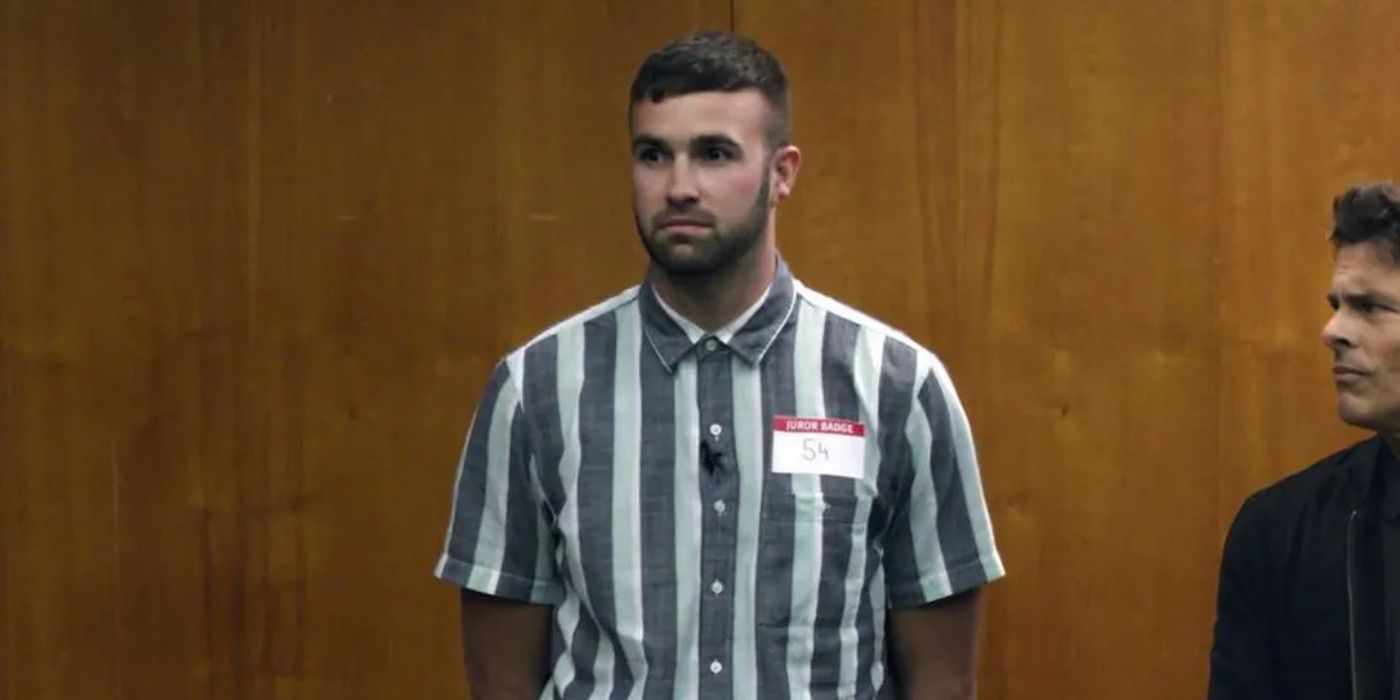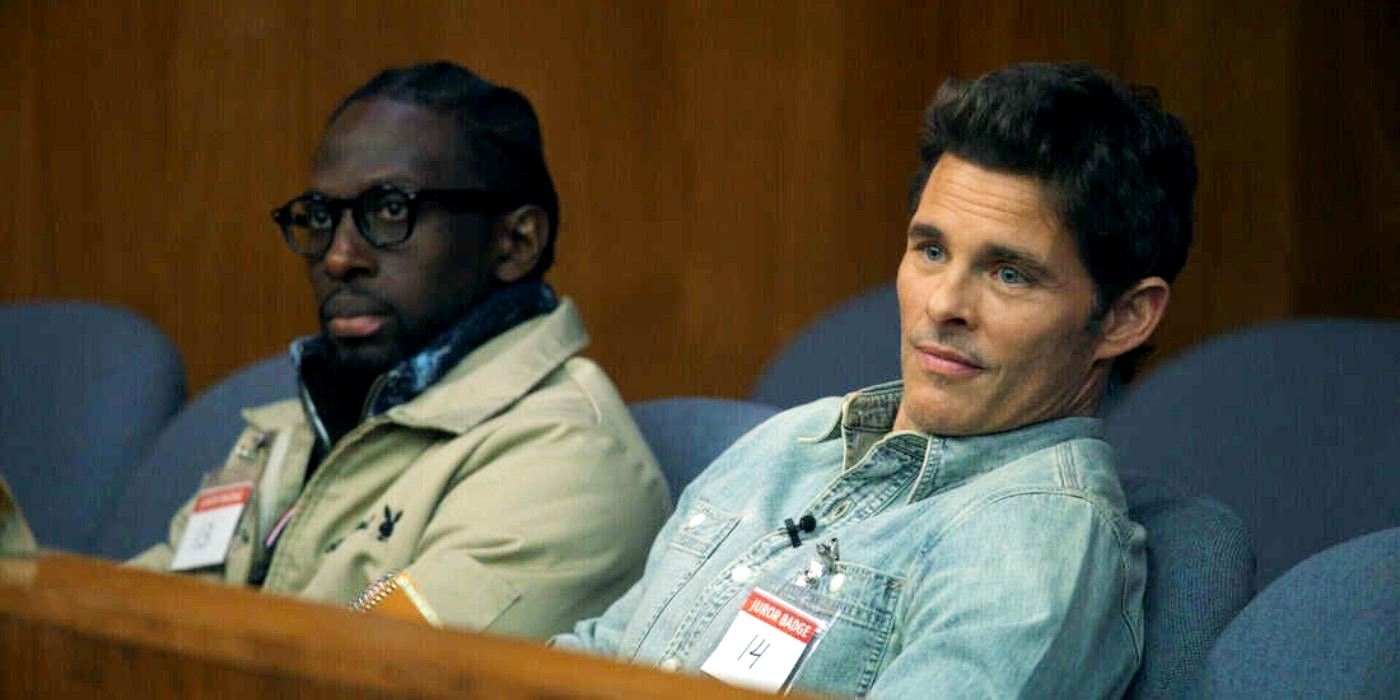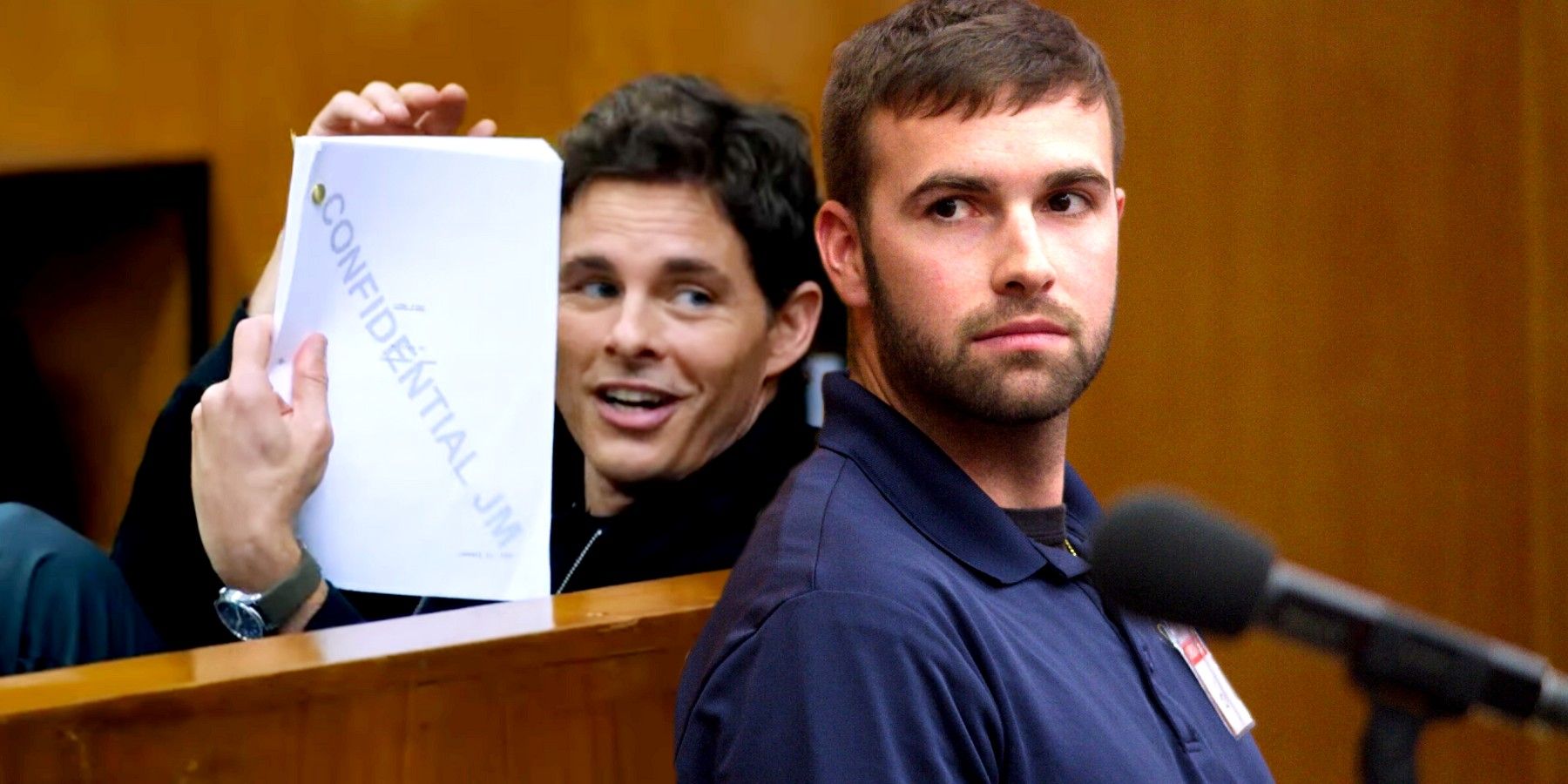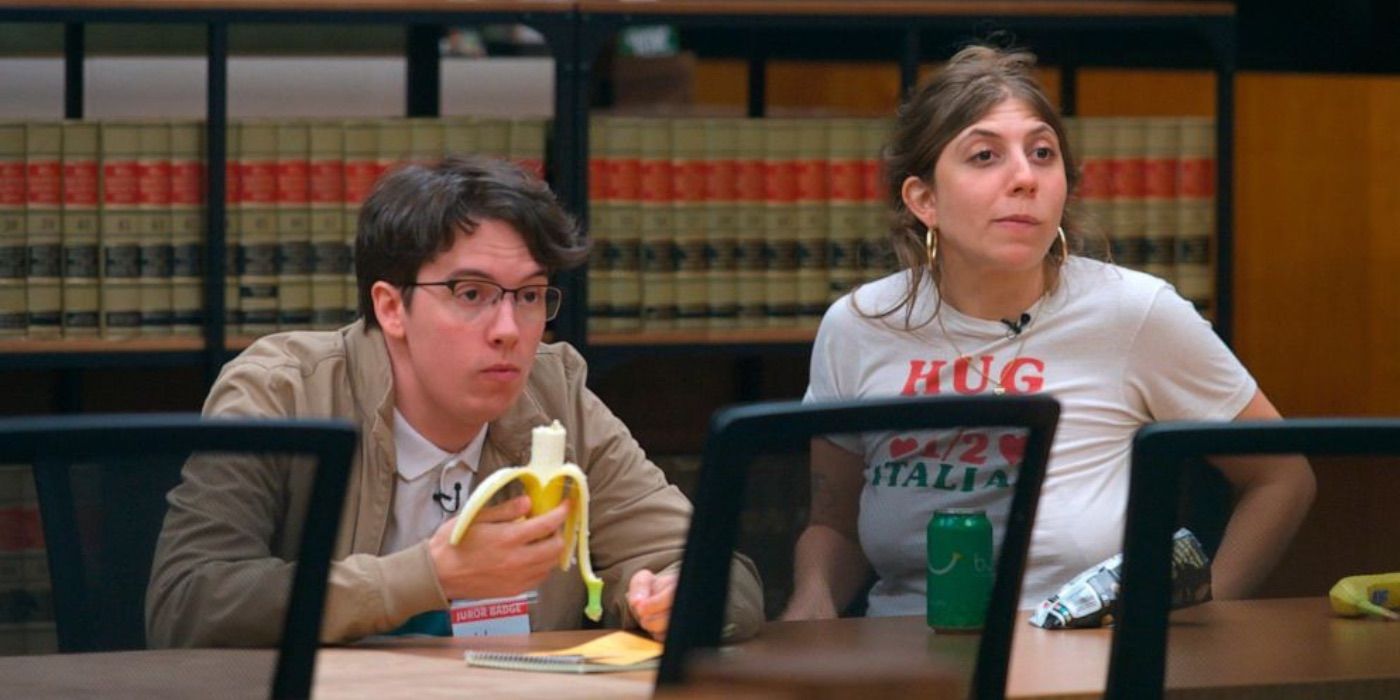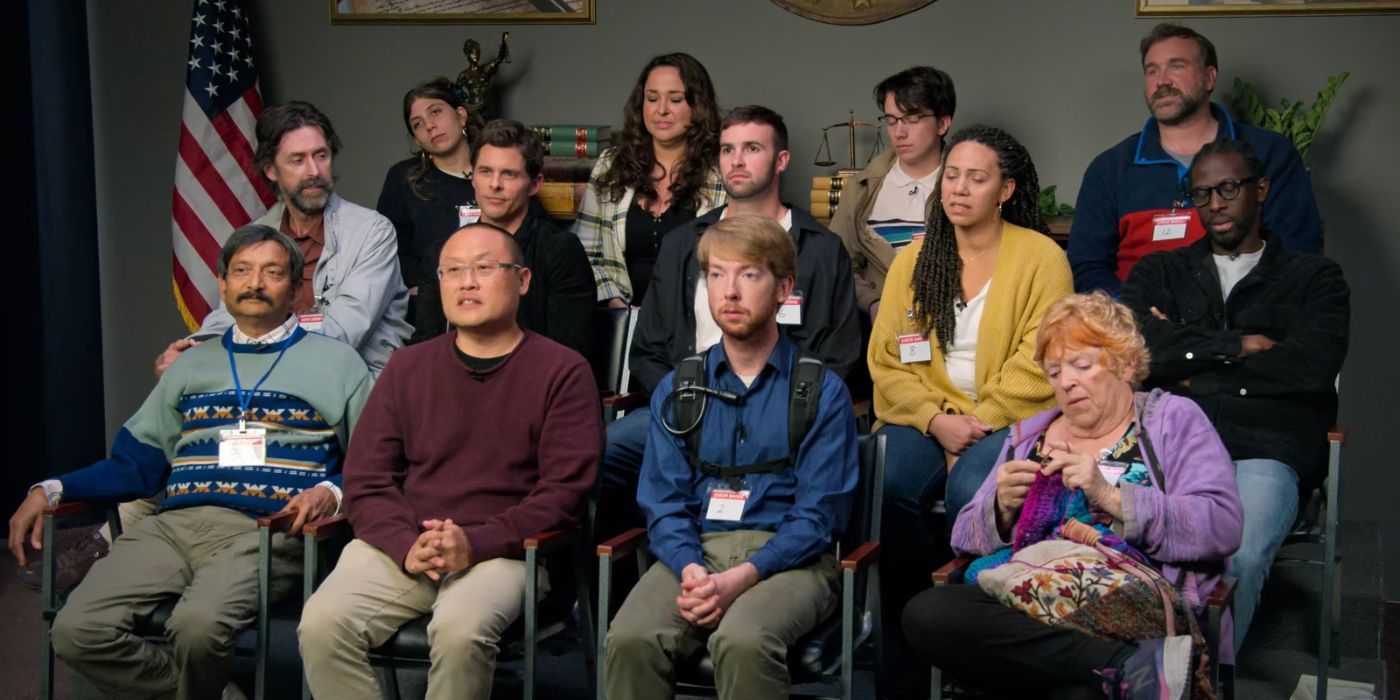Summary
- Season 1 of Jury Duty follows the unsuspecting Ronald, whom viewers loved because he's genuinely loyal in strange situations.
- Making sure Ronald didn't catch on was a challenge. EP Nick Hatton explained that they used a "reality bank" to balance normal and zany moments.
- James Marsden's presence added credibility and helped guide Ronald's actions. His performance was fueled by excitement and a desire to protect Ronald.
Jury Duty follows Ronald Gladden, a man who has no idea he is the only non-actor that is part of the show. All he knows is that he has been put on a jury for a very bizarre case, that gets stranger by the minute. He forms friendships with those around him, including actor James Marsden. Little does he know that everyone else around him is an actor as well.
Viewers all around the world fell in love with Ronald because he is a genuinely good, nice, and honest person. Even being put through the ringer, he never turned on his newfound friends and lost the loyalty he has for them. All eight episodes of Jury Duty season 1 are streaming now.
Screen Rant spoke with Jury Duty Executive Producer Nicholas Hatton about the popular series. He reveals his reaction to the love that came from viewers of the show, as well as if he thinks a second season could work, or should even be attempted. Nicholas also confesses one time that they had to pivot the outline of the show in order to protect Ronald's mental well-being. Note: This piece was written during the 2023 WGA and SAG-AFTRA strikes, and Jury Duty would not exist without the labor of the writers and actors in both unions.
Nicholas Hatton Talks Jury Duty
Screen Rant: How did this idea come about?
Nicholas Hatton: Originally, a colleague of mine who I'd worked with on the Who Is America? show with Sacha Baron Cohen, is a producer named Todd Schulman, and he had an idea, along with David Bernard, another producer of essentially, what if Jim from The Office was a real guy, and didn't realize that everyone around him was an actor, and you had a sitcom with a real person in the middle of it. That was the genesis of the idea.
They got together with Lee Eisenberg, and Gene Stupnitsky, who are two of the writer producers of The Office. They had an idea for putting it in a jury environment, and that was the basis of the idea. From that, they said, "Hey," to me, I was finishing Borat 2 and they said, "You're a weirdo who does lots of weird things with real people. Can you do this, please? We've got this idea. And we've sold it to Freevee." And they said, "Good luck." I said, "Okay," and then away we go, and here we are talking about it a couple of years later, which is kind of amazing.
Screen Rant: Do you have any thoughts on how a second season could be pulled off?
Nicholas Hatton: I don't know. I mean, I'm not sure if you can ever do it exactly quite the same way again. I think it's a great magic trick. And you don't want to do exact same magic trick twice. I'm not sure the audience will respond to it in the same way, as well. So can things be done? Yes. Do you want them to be done exactly the same way? Probably not. But there's a world of possibilities out there. And listen, right now, we haven't been talking about it, especially with the writers strike and the actors strike and respecting all that. So right now, we're just enjoying and basking in the glory of our little show that people ended up tuning into and really loving.
Screen Rant: What were the challenges in making sure that Ronald never caught wind that something was up?
Nicholas Hatton: Well, that was our biggest challenge, truly. The instinct that you just spoke about was the biggest hurdle for us. It's that thing of, you're making a TV show, so it has to be entertaining to people. You want to have jokes in there and make people laugh, but if you are a real person on a sitcom set, and someone was doing a zany bit to you, you might think they're having a psychotic break or need medication in some way. And so how do you balance those two things against each other? We came up with an idea which we called the reality bank.
The reality bank meant you would fill up the reality meter with very boring things, like five hours of introducing exhibitions in the court. Like, here's a bit of evidence, here's a piece of paper, and then the judge looks at it, and he takes five minutes, and then he challenges it. Then, within 24 minutes, you're just asleep. So the idea is you do that as much as you humanly can, then you would do a big bit like David Brown, who plays Todd, coming in with his chair pants or Marsden taking a massive poop. All those things. And you're cashing out of the reality bank at that moment. So it's depositing in and then making your withdrawals, and the idea being you want to keep a balance somewhere and a level where the person thinks this is a strange experience, but nothing so strange that I can't believe the reality around me. We really depended on that.
Screen Rant: James Marsden is great, but how did that work without it instantly being a tell?
Nicholas Hatton: Well, we're in L.A. That's very helpful because even famous people get summoned for jury duty. Everyone in the writers room had some experience of doing jury duty and being like, oh, a celebrity came in, and they were kinda cool, and then they left. So we knew it was a real normal thing. There had always been the idea of having some sort of celebrity in the mix for a couple of reasons.
One, it's more of a solid selling point for a show which no one has ever seen before. It's a concept that people might not even believe can be done. So if you put a famous actor in there, makes it a bit more marketable. Also, the whole thing with Ron was he could take a left turn, or he could take a right turn. We couldn't control all of his actions, all we could do was build a very complicated sandpit around him with certain guide rails, and hopefully he'd go the right way. What a celebrity does, and what James did brilliantly was, if you're facing a left or right decision, if someone who's famous or someone you respect says, I think we should go left, you as a normal person are more inclined to be like, ah, you know, left does sound good now that you say that. So it was another way of us steering Ronald in certain directions, and it just so happened that James was unbelievably funny and completely brilliant and threw himself into it so entirely that it was magic the way it all came together.
Screen Rant: Can you talk about bringing him onto the project?
Nicholas Hatton: The thing about James is he was filming a lot at that time. For most of our cast, we had a couple of weeks with them in the courthouse, and they had just been literally dropped into it because we gave them such little information. It's actually almost scandalous that they even agreed to do this in the first place. Because I was quite paranoid about information getting out. We had to create this entirely fake real world. So in good faith, they joined us, and they had been with us for about a week. But James, because of scheduling issues, could only come in the second week.
During that first week of rehearsals, we have all this cast around, and no James, and we'd say every day, don't worry, James is going to be here in a couple of days, I promise he's going to be here in a couple of days. To an extent that a rumor went around our cast that this was, in fact, the show. That we were filming the rehearsals and seeing if we could mess with actors, and make them to believe that another show was about to happen. Obviously wasn't the case.
Then James comes in the second week, and truly he was dropped into it, we had so little time to go through all the beats we needed to and to just get up to speed with everything. But he attacked it with such gusto. And it was a lot of fun. He really went for it. I think you could feel two things. One was his excitement of being able to do this improvised high wire act without a safety net that he had never done before. The fact that he had a slight tension and fear inside him that we were always doing the right thing, and that Ron would never be the butt of the joke. That ultimately, his journey would be the one that was celebrated. I think those two things really fueled an incredible energy and performance coming out of James. And that's what we ended up seeing on screen. And it's a marvel.
Screen Rant: How did you settle on Ronald for the show?
Nicholas Hatton: He really is. So yeah, we sent out some great Craigslist adverts for folks to see if they'd be interested in participating in a trial in Southern California. They had to be jury eligible, so of a certain age, U.S. citizens, and a very important detail is they couldn't have done jury duty before. The reason being, anyone who's done jury duty before would turn up to our courthouse and within five minutes of proceedings going weirdly, it'd be like this is not how this is done in any way, shape, or form. Even the vote of the final verdict, which was unanimous, 12 votes. That's not how it works. In a civil case, it's a simple majority, you don't need to get to all. So it was very important that whoever did this thing, had no idea how juries actually work.
Ronald was one of the applicants. Alexis Sampietro, one of our fantastic producers, who was essentially tasked with finding real people for this kind of stuff. She got to know him. It's an art, it's not a science. You have to go with a gut feeling sometimes. I remember when we had our shortlist, Alexis put Ronald at number one and said, I just have a feeling about this guy. He's good. People will respond to him, and they will root for him. That was the most important thing. Making the show that our audience would end up rooting for the guy, and feel happy at the end of it when he comes through this experience.
Screen Rant: He's just such a good person. Always keeping secrets for everyone.
Nicholas Hatton: It does show there's a value in keeping your counsel, and being nice, and being supportive, and giving advice when it's asked for. And at the same time not actually messing with other people's business too much. There is a blueprint for quite good living here, which I think Ronald has shown us.
Screen Rant: I love that the final episode revealed the truth behind the curtain. It even had me crying. Can you talk about the importance of including that?
Nicholas Hatton: It was always designed to have seven narrative episodes, and then an eighth episode, which would be, here's how we did the magic trick. Because there was a show, which I think was similar to ours in the 2000s, called the Joe Schmo Show, which was a similar-ish concept, but they all believe they're on a reality show. When we were watching, we noticed that they check in with the actors behind the scenes very frequently. Kristen Wiig is in it, it's an amazing cast. You see her, five minutes into the first episode going, Oh, my gosh, I was so nervous when I met him for the first time, it was so crazy, I almost forgot my name, or what have you. We didn't want to do that because we felt that we wanted to do a magic trick and allow the audience to get invested in it, enjoy it, have the emotions, come over them as they may. And at the end, if you're still interested, because we thought there might be some questions, we would peek behind the curtain and give you a taste of some of the stuff that we did.
It worked out really, really well. It worked out really well. I didn't think it would have, the eighth episode, specifically, such an emotional resonance with people because what you said has been said by many, many folks that they were crying during the eighth episode. I think that's because you see that the relationships that our cast have formed with Ronald, are real. Yes, there is obviously an element of deception to take him through this entirely fake journey, but the love they felt for him was completely truthful. It came from themselves and has carried on since the show has been out, and they're all still very close and a big part of each other's lives.
Screen Rant: What was it like when all the positive reactions started flooding in?
Nicholas Hatton: It's unlike anything else I've ever witnessed. I'll be really honest, when it started the week of release, there was not much going on. Our team at FreeVee worked so hard to get the show into a position of success. With the marketing, the publicity, they were really pushing as hard as they could, but they had limited resources. There's loads of TV shows and movies come out every single day. That's kind of the problem we're having right now. In the week before we launched, it didn't feel like that many people were talking about it. They didn't feel like there was a groundswell of anticipation.
I do remember we had a cast and crew screening on the Wednesday before the show aired, and it was very much that feeling of everyone coming together and being like, you know what, we did something really, really hard. And everyone did it in the right way. And we all love each other as an experience. And aren't we proud of this thing that we did? But that was it. That maybe no one would ever watch the show. Then you fast forward, essentially a week later, after the first four episodes drop, and the world changed and people had seen. Then this momentum builds up in such an insane way. It feels like truly an old fashioned word of mouth story, but powered through 21st century technology, which is TikTok. God bless TikTok, which exposed millions of people to it, which got them interested and the show. If someone engaged with the show, they then wanted to tell other folks about it. I think that's the nature of the success of it and hard thing to replicate. I don't know how you try and do that intentionally. You just hope you can make the best thing possible and people like it and then here we are.
Screen Rant: I told so many people about this show. I remember talking to my mom on the phone and encouraging her to check it out.
Nicholas Hatton: That experience of you talking to your mom, that really is anecdotally the thing that I've heard from hundreds of people. Where they say, I was in a grocery store checkout line in Scotland, and the person bagging my groceries was talking about there's a guy, and he doesn't realize that he's in the middle of a trial, but he's a nice dude, and then James Madison poops. From so many corners of my life, I would hear all these anecdotes and these stories, and it really did feel like a thing that just caught fire with folks, and they just needed to tell people about it.
Screen Rant: Did you ever have to pivot while filming because of something that unexpectedly happened?
Nicholas Hatton: Shockingly, we didn't diverge that much from the script-slash-outlines that we had just before we started shooting. A lot of the beats, especially a lot of the big beats you see in the show from, the auditions, to the I'm not racist, to the factory trip, Margaritaville, and the arm wrestle, that was all written in advance. It's a testament to our writers and to our actors, and to all of our crew that were able to guide Ronald's experience so that he would unwittingly hit all of these marks.
But there were a couple of occasions where we had to pivot because we had learned something which we haven't thought about. So for example, Ronald has a very close relationship with Ken, who is played by Ron Song. Ken was a bit of a gambler and had a bit of a problem with this Korean game named Yute. Ronald had an incredible time playing it with Ken, until Ken lost a great deal of money to Ronald, which was planned. What we didn't anticipate with that was that Ronald would feel so awful about winning a game that he didn't even understand how to play, that he actually became slightly distressed about it.
Ron Song would stick with it. He'd stick with the beats he had to hit. Like, a level of concern but be trying to brush it off, it's fine, it's fine, don't worry about it, whilst at the same time internally dying. We had to pivot because there was a plan for Ken to flee the jury. In episode 106, when they're in the park, and Ross's wife comes in, and it's a bit of a down episode. Ken was also meant to disappear during those festivities and flee. We realized that we couldn't really do that, because it would upset Ronald. It would cut him up, and we didn't want to make him feel really bad about his experience, especially if he felt like he in any way contributed to Ken now being on the run from the law. So yes, there were things that we had to change. But remarkably, on the whole, we stayed on course.
About Jury Duty
Chronicling the inner workings of an American jury trial through the eyes of juror Ronald Gladden, who doesn't realize that everyone, except him, is an actor.
Jury Duty season 1 is streaming on Freevee now.
Source: Screen Rant Plus

